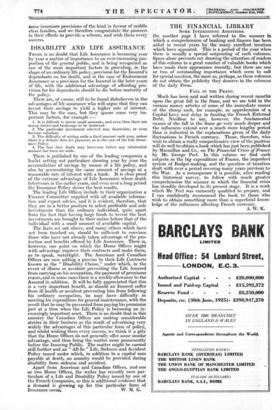DISABILITY AND LIFE ASSURANCE THERE is no doubt that Life
Assurance is becoming year by year a matter of importance to an ever-increasing pro-. portion of the general public, and is being recognized as one of the most important factors in providing, in the shape of an ordinary life policy, provision for the Insured's dependaits on his death, and in the case of Endowment Assurance as a provision for the Insured in the later years of life, with the additional advantage of affording pro- vision for his dependants should he die before maturity of the policy. There are, of course, still to be found disbelievers in the advantages of life assurance who will argue that they can invest their savings to yield a higher rate of interest. This may be the case, but they ignore some very im- portant factors, for example :— 1. It is difficult to invest small amounts, and even then there are stamp duties and brokerage to be deducted.
2. The particular investment selected may depreciate, or even become valueless.
3. The difficulty of setting aside a fixed amount each year, unless there is a definite date for payment, as in the case of the Life Insur- ance Policy.
4. The fact that death may intervene before any substantial amount has been set aside.
There is published by one of the leading companies a leaflet setting out particulars showing year by year the accumulation of savings by means of a life policy, and also by accumulating the same amount of savings at a reasonable rate of interest with a bank. It is clear proof of the extreme advantage of Life Insurance where death intervenes in the earlier years, and even over a long period the Insurance Policy shows the best results. The leading Life Offices include in their organization a Finance Committee supplied with all available informa- tion and expert advice, and it is evident, therefore, that they are in a better position to select profitable and safe investments than the ordinary individual, quite apart from the fact that having large funds to invest the best investments are brought to their notice before that of the individual with a small amount of available capital.
The facts set out above, and many- others which have not been touched on, should be sufficient to convince those who have not already taken advantage of the pro- tection and benefits offered by Life Assurance. There is, however, one point on which the Home Offices might with advantage improve their contracts and make them, so to speak, watertight. The American and Canadian Offices are now adding a proviso to their Life Contracts known as the " Disability Clause," under which, in the event of illness or accident preventing the Life Assured from carrying on his occupation, the payment of premiums ceases, and in some cases there is a weekly allowance to the Assured in addition. It will be fully appreciated that this is a very important benefit, as should an Insured suffer from ill health or accident preventing him from following his ordinary occupation, he may have difficulty in meeting his expenditure for general maintenance, with the result that he may be prevented from paying his premiums just at a time when the Life Policy is becoming an in- creasingly important asset. There is no doubt that in this country the Canadian Offices are making considerable strides in their business as the result of advertising very widely the advantages of this particular form of policy, and whilst wishing them every success, we think it a pity that the Home Offices do not generally offer some similar advantage, and thus bring the matter more prominently before the Insuring Public. The matter might be carried still further and an " All-In " Life, Sickness and Accident Policy issued under which, in addition to a capital sum payable at death, an annuity would be provided during disability from sickness and accident. Apart from American and Canadian Offices, and one or two Home Offices, the writer has recently seen par- ticulars of a Life and Disability Policy issued by one of the French Companies, so this is additional evidence that a demand is growing up for this particular - form of






























































 Previous page
Previous page